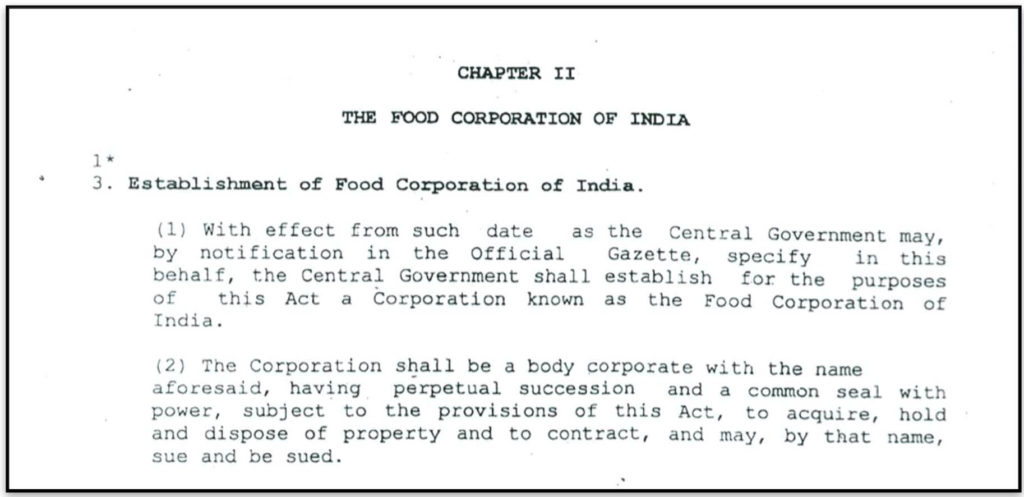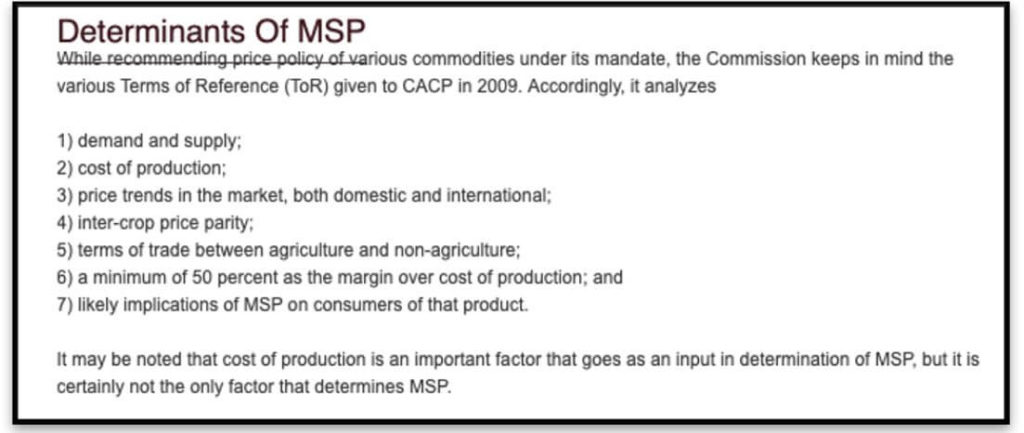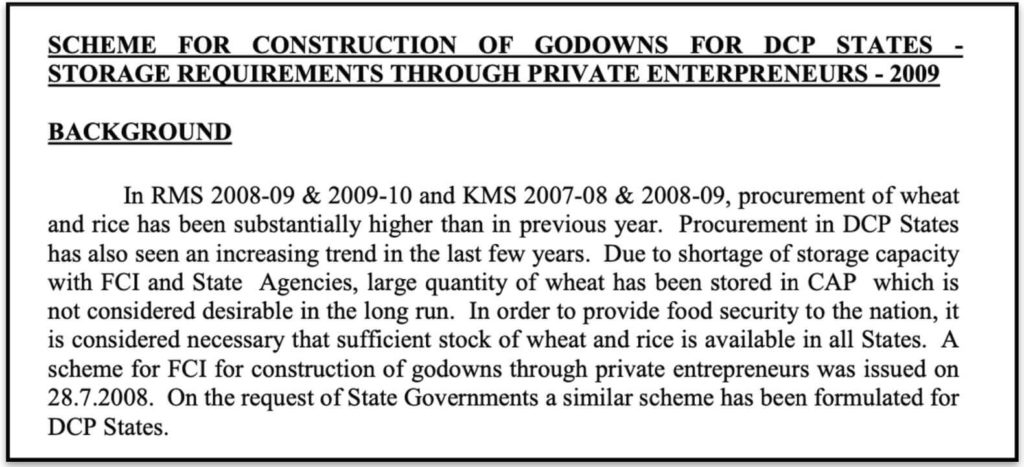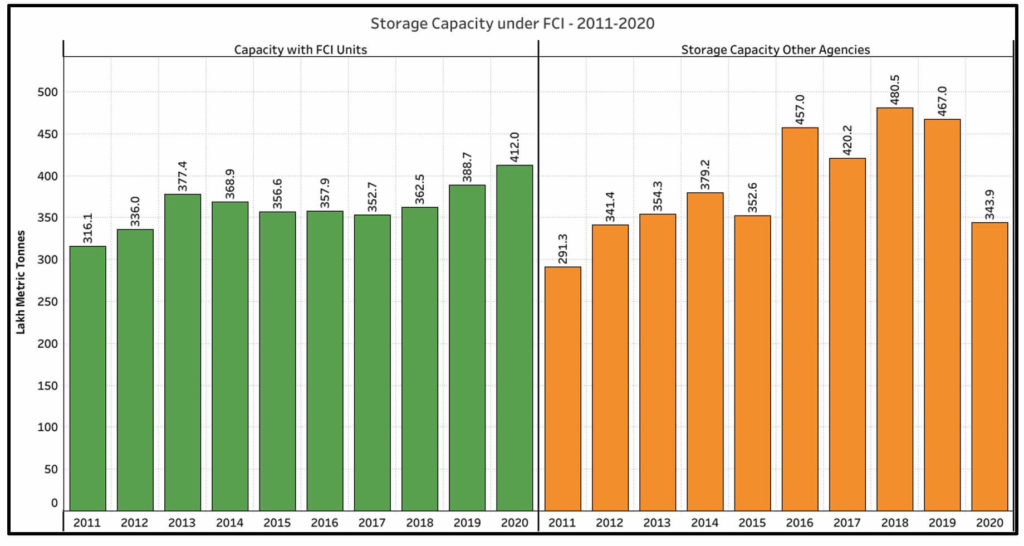An important part of the relief packages announced by the Central & State governments is the provision of free food grains to the needy. The Food Corporation of India (FCI) plays a major role in ensuring availability of adequate stocks.
The marginalized sections of the society like migrant workers, daily wage earners, low income families etc. were among the worst hit due to the lockdown imposed because of COVID-19.
Majority in these sections of population are facing a situation of potential starvation. Hence, a substantial portion of the relief measures announced by the governments is to provide food security in the form of free and subsidized supply of food grains.
But how do governments procure food grains required to supply to these sections of the society? Does government already hold stocks of these food grains to meet the unexpected demand? This is where the role of Food Corporation of India (FCI) assumes importance.
Maintaining buffer stocks of food grains – the primary objective of FCI
The Food Corporation of India (FCI) was established under Food Corporations Act, 1964.

There are three stated objectives of Food Policy which FCI intends to fulfil:
- Effective price support operations for safeguarding the interests of the farmers
- Distribution of food grains throughout the country for Public Distribution System (PDS)
- Maintaining satisfactory level of operational and buffer stocks of food grains to ensure National Food Security.
The guiding objectives of FCI in order to fulfil the above objectives of food policy include:

Procurement of food grains at MSP
One of the important functions of FCI is its involvement in the procurement of the food grains. The objectives of procurement include
- Ensuring MSP to the farmers
- Availability of food grains to the weaker sections at affordable prices.
FCI procures food grains to ensure that effective market intervention is in place to keep the prices under check and also to ensure country’s food security.
- FCI is the nodal central agency of Government of India. FCI, along with other state agencies takes up the procurement of Wheat and Paddy. This is done under the Price Support Scheme.
- Apart from these two, Coarse grains (Jowar, Bajra etc.) are also procured. This is taken by the State Government agencies as per the directions issued by Government of India.
- The Government of India announces the Minimum Support Prices (MSP) as per the recommendation of Commission of Agricultural Costs and Prices (CACP) , prior to every harvest ( Rabi/kharif season).

- All the stocks (which meet the criteria specified by the government) that are brought to the procumbent centers are purchased at the fixed price specified.
- The farmers have the freedom to sell elsewhere (i.e. to traders, millers etc.) if a higher price is offered. FCI and other government agencies are required to provide safeguards such that farmers are compelled not to sell at a lower price.
FCI and various state agencies establish purchase centers at various key locations. For the upcoming Rabi Marketing Season 2020-21, there are 21,269 procurement centres, while for the procurement of Paddy for the Kharif Marketing Season, there are around 64,500 centres.
Increase in FCI owned Storage Capacity
FCI is also required to hold huge volumes of procured food grains for a sustained period of time, both for the planned delivery through PDS as well as for any unforeseen situations. Therefore, Storage function of FCI is very important.
To meet the storage obligation, FCI has an extensive network of storage depots and silos in strategic locations across the country. FCI has laid down the guidelines and developed Storage manuals to be followed by the storage units to ensure that any spoilage of the food grains is mitigated.
Apart from its own storage capacity, FCI also hires storage capacities from – Central Warehousing Corporation (CWC), State Warehousing Corporations (SWCs), State agencies and also from Private parties (under Private Warehousing Scheme).
The government of India determines the storage charges payable to CWC and SWCs for the godowns hired from them.
FCI also has storage options in the godowns constructed by private entrepreneurs under Private Entrepreneurs Guarantee Scheme (PEG).

As of 01 April 2020, FCI has a total storage capacity of 755.94 lakh metric tons. Out of this, FCI owned units have a storage capacity of 412.03 lakh MT, while the storage capacity of other agencies that FCI has contracted with is 343.91 lakh MT.
The total capacity as on 01 April 2020, is lowest for the five-year period (2016-20). However, this mainly due to the fall in the storage capacity of other agencies. During this period FCI has increased its capacity from 357.9 lakh MT (2016) to 412 MT (2020)

There have been apprehensions about the wastage of food grains stored in FCI godowns, even though the central government has recently claimed that any such wastage is negligible. Data obtained from the FCI substantiates the argument of the government that the wastage has come down substantially in the 10 years or so.
FCI maintains that it follows a scientific approach and has developed guidelines about measures to be taken for storage of food grains.
Movement and Distribution of the stock to deficit regions
Movement and distribution of the food grains is another important function of FCI. This is to ensure that the food grains are distributed to states as per the requirement of various welfare measures announced by the government.
FCI undertakes movement for the following purposes:
- To evacuate food grain stocks from the surplus regions.
- Supply them to deficit regions for distribution through PDS and other schemes.
- To create buffer stocks in deficit region.

The distribution is also done for Coarse grains, apart from Wheat and Rice. FCI undertakes the movement of food grains from these surplus states (after meeting their own requirement) to the deficit states. Nearly 85% of this movement happens through Rail transport while Waterways and Roads are also used.
Achieving the goals of food security is an important mandate of FCI and hence it oversees the distribution of food grains under TPDS (Targeted Public Distribution System), National Food Security Act (NFSA) and other welfare schemes such as – Mid day meals, supply to welfare institutions and hostels, Scheme for adolescent girls etc.
Apart from distribution under PDS/NFSA, FCI also undertakes the supply of food grains for:
- Defence and Paramilitary forces
- Natural Calamities
FCI also facilitates sale of surplus stock under Open Market Sales Scheme. This is done to supply the markets with food grains, especially during the lean season and to avert a situation of price rise due to lower supply of the food grains. FCI is supposed to transfer food grains to the deficit regions for this purpose.

Export of Food grains under World Food Program and other aid
Apart from the domestic distribution of the food grains, FCI also takes up export and import of food grains as per the instructions and guidelines of Government of India.

FCI plays a key role in fulfilling food security provisions of the COVID-19 relief package
The government of India had initially announced a Rs. 1.7 lakh crore COVID-19 relief package on 26 March 2020. This was followed by a Rs. 20 lakh crore package, announced on 12May 2020.
As mentioned in our earlier story, different states have also announced respective relief packages. Provision of food grains to the marginalized sections of the society is a key part of the relief package.
We looked at the role which FCI is expected to play in the procurement, storage and distribution of the food grains, especially in wake of an unexpected situation.
In the next story, we take a look at the policies and systems in place for procurement of the various food grains along with analysis of the stocks procured by FCI along with actual stocks of food grains available for distribution to meet the requirements of the relief package along with other PDS requirement.
Featured Image: Food Corporation of India


